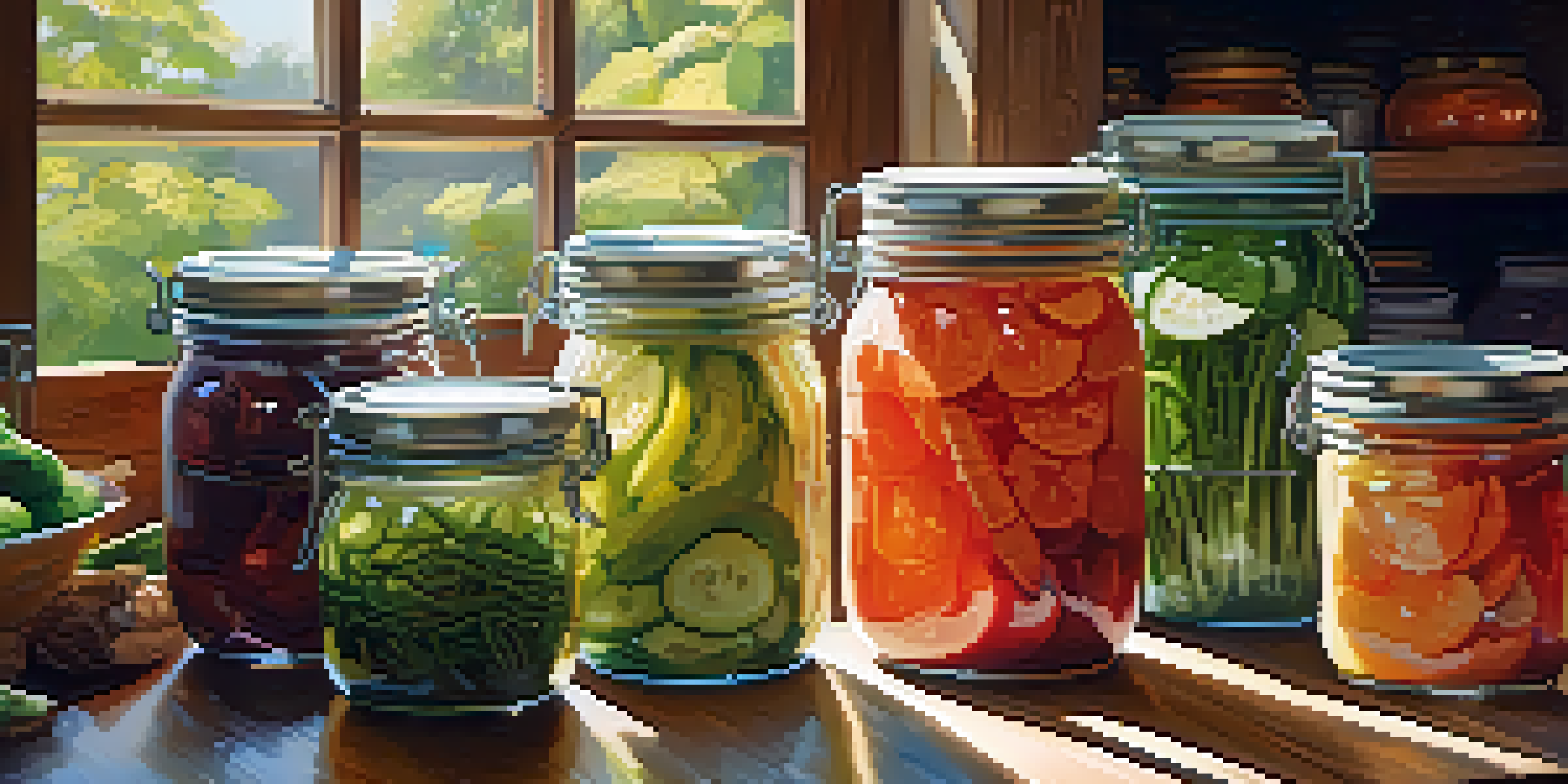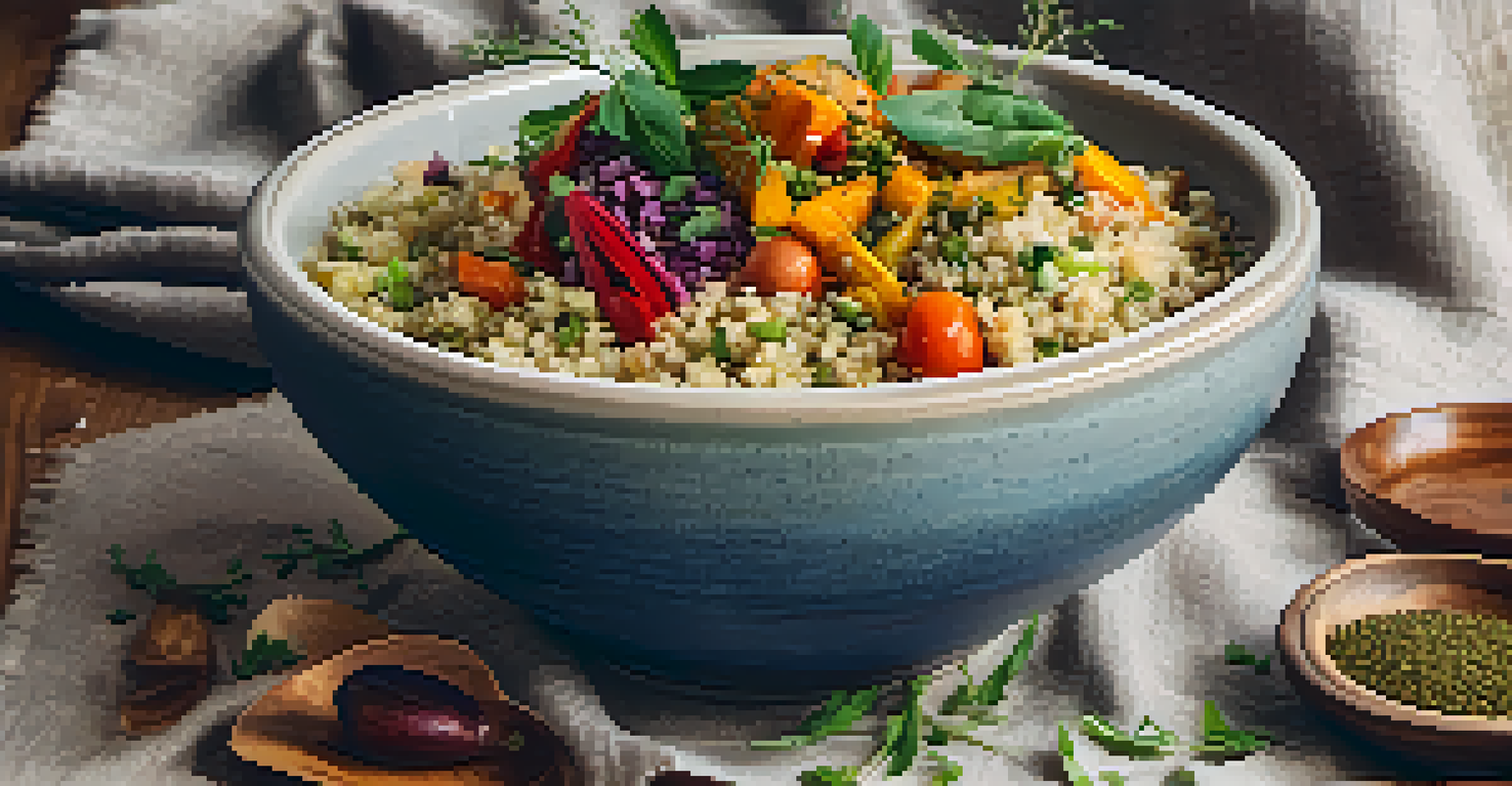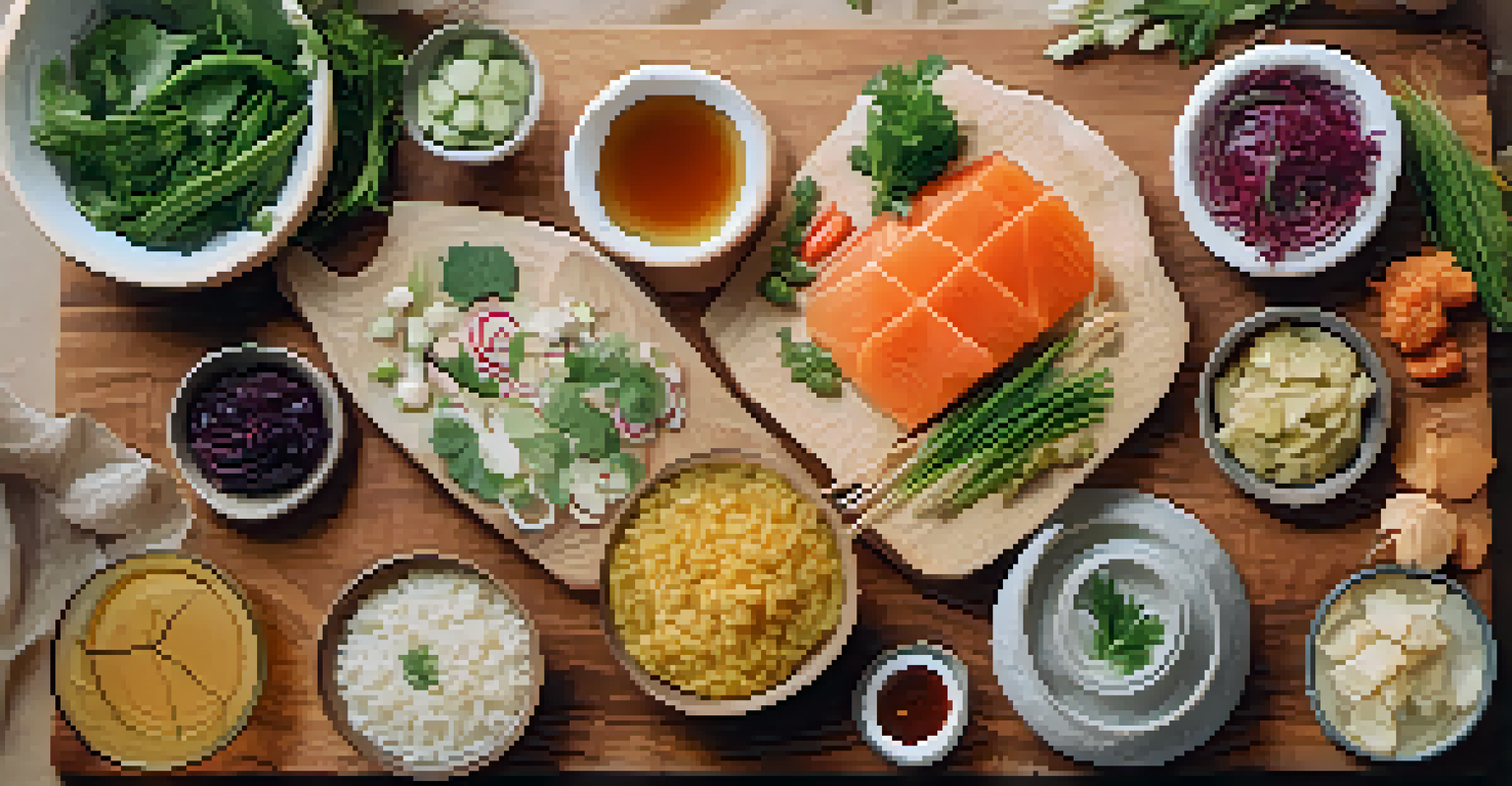The Role of Fermented Foods in Vegan Meal Planning

Understanding Fermented Foods and Their Benefits
Fermented foods are those that have undergone a process where natural bacteria feed on the sugars and starches in food. This process not only preserves the food but also enhances its nutritional value. For example, foods like sauerkraut and kimchi are rich in probiotics, which are beneficial for gut health.
Fermented foods are a great way to add flavor and nutrition to your diet while supporting gut health.
These foods can transform your vegan meals into nutrient powerhouses. They are packed with vitamins, minerals, and healthy bacteria that support digestion. Incorporating fermented foods can also add unique flavors and textures to your dishes, making them more enjoyable.
In addition to enhancing nutritional content, fermented foods can help with the absorption of nutrients. The fermentation process breaks down food components, making them easier for your body to digest and utilize. This is particularly beneficial in a vegan diet, where maximizing nutrient intake is crucial.
Incorporating Fermented Foods into Vegan Diets
Integrating fermented foods into your vegan meal planning can be an exciting culinary adventure. Start by adding items like tempeh, miso, or kombucha to your weekly grocery list. These foods not only provide essential nutrients but also introduce new tastes and aromas to your meals.

You can easily incorporate fermented foods into smoothies, salads, or main dishes. For instance, a scoop of miso can elevate a vegetable soup, while a splash of kombucha can add a refreshing note to a fruit salad. The versatility of these foods makes them easy to blend into everyday meals.
Fermented Foods Boost Nutrition
Incorporating fermented foods like kimchi and miso enhances the nutritional value of vegan meals by adding probiotics and aiding nutrient absorption.
Moreover, making your own fermented foods at home can be a fun project. Simple recipes for foods like pickles or yogurt can be found online, and they allow you to control the ingredients. This not only ensures freshness but can also save money compared to store-bought options.
Health Benefits of Probiotics in a Vegan Diet
Probiotics, the beneficial bacteria found in fermented foods, play a crucial role in maintaining a healthy gut microbiome. A balanced gut microbiome supports digestion, boosts immune function, and can even improve mood. For vegans, who may sometimes struggle with gut health due to dietary restrictions, probiotics can be a game changer.
Food is the ingredient that binds us together.
Research has shown that incorporating probiotics can help alleviate digestive issues such as bloating and constipation, which can be more common in plant-based diets. Foods like sauerkraut or dairy-free yogurt are excellent sources of probiotics and can help maintain gut balance.
In addition to aiding digestion, probiotics have been linked to various health benefits, including reducing inflammation and enhancing nutrient absorption. This can be particularly beneficial for vegans, who often seek to maximize the health benefits of their diets.
Fermented Foods and Flavor Enhancement
One of the most delightful aspects of fermented foods is their ability to enhance flavors in vegan dishes. The fermentation process develops complex tastes, which can elevate an otherwise simple meal. For example, adding a spoonful of kimchi to a rice bowl can transform it into a flavorful feast.
Fermented foods can also introduce new flavor profiles that might not be achievable with traditional ingredients. The tangy and umami flavors of miso or nutritional yeast can provide depth to sauces, dressings, and marinades. This encourages creativity in the kitchen and can make healthy eating more enjoyable.
Culinary Variety with Fermentation
Fermented foods introduce unique flavors and textures that can elevate everyday dishes, making healthy eating more enjoyable.
Moreover, experimenting with different fermented foods can inspire meal variety and reduce monotony in your diet. Trying different types of pickles, fermented vegetables, or flavored kimchi can keep your taste buds excited and engaged.
Balancing Fermented Foods with Other Vegan Staples
While fermented foods are a great addition to a vegan diet, balance is key. It's essential to incorporate a variety of foods to ensure you're meeting all your nutritional needs. Pairing fermented foods with whole grains, legumes, and fresh vegetables can create a well-rounded meal.
For instance, a bowl of quinoa topped with roasted vegetables and a side of sauerkraut combines the benefits of probiotics with fiber and protein. This not only enhances taste but also provides a balanced intake of macronutrients.
Remember that moderation is important. Though fermented foods are beneficial, consuming too much can lead to digestive discomfort for some people. Aim to introduce them gradually into your meals and observe how your body responds.
Cultural Significance of Fermented Foods
Fermented foods are not only nutritious but also rich in cultural history. Many cultures around the world have embraced fermentation as a method of food preservation and flavor enhancement for centuries. From Korean kimchi to German sauerkraut, these foods reflect the traditions and lifestyles of various communities.
Incorporating these foods into your vegan meal planning can also be a wonderful way to explore different cultures. Trying out recipes from various cuisines can broaden your culinary skills and increase your appreciation for global flavors.
DIY Fermentation is Fun and Easy
Making your own fermented foods at home allows for customization, freshness, and can serve as a rewarding culinary project.
Moreover, sharing these dishes with friends and family can foster connection and conversation. Food has a magical way of bringing people together, and exploring the world of fermented foods can create meaningful experiences around the dinner table.
DIY Fermentation: A Fun and Rewarding Activity
If you're feeling adventurous, why not try your hand at DIY fermentation? Making your own fermented foods can be a fun, rewarding activity that also allows you to customize flavors to your liking. Simple recipes for items like kimchi, pickles, or even plant-based yogurt can be found online.
The process of fermentation is straightforward and requires minimal ingredients. All you need are fresh vegetables, salt, and a little time. Watching your creations transform over days can be fascinating, and the end result is often delicious and satisfying.

Plus, homemade fermented foods can be a great conversation starter. Sharing your journey with others can inspire them to try fermentation too, fostering a community around this age-old practice. It's an engaging way to enhance your vegan meal planning while having fun in the kitchen.